The Great and Holy Council, which is due to gather in June of 2016 in Crete, was "the expectation" of many whose vision it was, and who tired in order to prepare for it, and now the Council finally moves towards its convocation. The question here put forth is whether the Holy and Great Council really is the one awaited by those who originally envisioned it.
Much has been written and said about this subject. Some express their joy, because the longed for hour has finally come. Others express deep concern, deep hesitation, and others feel complete disappointment. I will in this short piece limit myself to a few remarks.
1. Primates of the Synod
The soon to be convened Council has been termed the Holy and Great Council of the Orthodox Church, but will in reality be a Council of Primates of the Orthodox Churches.
I base this view on the fact that all important decisions were taken by the Primates of the Orthodox Churches. On the 6th—9th of March 2014 in Constantinople, the Primates decided that the Holy and Great Council was to be convened in July of 2016 and determined which themes were to be discussed. In Chambesy, Geneva, the Primates (except for the Patriarchate of Antioch) voted on the 27th and 28th of January 2016 on the Working Procedure and the prepared texts from the Committees, with the exception of one subject not signed by two patriarchates (Antioch and Georgia). Prior to the opening of the Holy and Great Council, the Primates will sign the message of the Sacred Council, which will be drawn up by one representative from all the Orthodox Churches.
The program of acts of the Holy and Great Council will be decided by the Primates.
Finally, the texts in their final form will be voted on and signed by the Primates of the Orthodox Church. Thus, as seen from the above, this Council is primarily a Council of the Primates of the Orthodox Churches. And this is not completely accurate, because the presence of Patriarch John of Antioch has until now been incomplete or non-existent, and thus his presence is for the time being disputed with regards to the work of the Holy and Great Council [We now know that the primate and delegation of Antioch, as well as those of Bulgaria and Georgia, and likely Serbia will not be present at the Council—O.C.].
Thus, this is not even a Council of all the Primates. Theoretically, of course, it is assumed that the Primates expressed or express the decisions of their respective Synods. But this is only theoretical. Although the system of the Orthodox Church is synodical, many subjects are not decided by the Synods.
I am not sufficiently aware of what happens in other Orthodox Churches, but I know well what happens in our own Church. The opinions of the Hierarchs of the Church of Greece were not sought with regards to the decision to hold the Holy and Great Council, which was taken in March 2014, or the with regards to the texts signed in January of 2016, nor were these discussed during meetings. As for the rest, such as the message which is to be published by the Holy and Great Council, I do not know whether it will have the consent and decision of our Hierarchy. Thus, the soon to be convened Sacred Council is a Council of Primates and not a Holy and Great Council of the Orthodox Churches.
Furthermore, it must be stressed that I have complete respect for His Beatitude, Archbishop Hieronymos of Athens and All Greece, who leads the Church of Greece with respect for the Synodical system, listens to the views of the Hierarchs, and always accepts the decisions of the Hierarchy without seeking to manipulate it.
However, there is a Patriarchal Letter, which was sent to the Church of Greece on the 30th of September 1999, according to which the Church of Greece does not have a Primate, but rather it is the Sacred Synod which acts as Primate. Could this, perhaps be interpreted as a retraction, or otherwise? In any case, whatsoever the outcome of this Sacred Council, in the final analysis all pronouncements will be decisions of the Primates of the Orthodox Churches.
2. The sidelining of Great Councils
This Council was planned and prepared as an Ecumenical Council and plans were first formulated in 1923, on the 1600th anniversary of the First Ecumenical Council. About a hundred issues were put forth, which had arisen throughout the period of the second millennium, with the schism of the western part of the Roman Empire (eighth to eleventh century), the division also of western Christianity (fifteenth century), the development of various ideological currents, such as the Enlightenment, Romanticism, German idealism, existentialism, as well as the secularization of Christianity itself.
Eventually, all of the dreams of the "Fathers" of this idea resulted in it becoming, not an Ecumenical Council, but a Holy and Great Council which is still unable to find its identity, tackling just six issues that are vague, untimely, without a clear cut goal, and some of which are detached from the tradition of the Fathers. I have heard and read many claim that a Holy and Great Council has not been held for about 1,200 years and that it will now be held for the first time after such a large period of time. This claim raises serious concerns to all who are familiar with theological literature and the tradition of the Church.
This assertion gives the impression that there exists an ecclesiastical breach after the Seventh Ecumenical Council which had to be covered, despite the fact that great and important Councils have been held, such as that of Photios the Great (879-80), of St. Gregory Palamas (1341-1351), as well as other important Councils which took place between the fifteenth and eighteenth centuries and made key decisions.
This assertion, consequently, gives the impression that all of these important Councils have been overlooked and marginalized.
I regard this on our part as an "insult" to our saints, Photios the Great, St. Symeon the New Theologian, St. Gregory Palamas, St. Kallistos and Philotheos Kokkinos the Patriarchs of Constantinople, St. Mark of Ephesus and all the Orthodox Patriarchs of the East during the fifteenth to eighteenth centuries.
These saints are naturally not slighted, since their teachings have reached ecumenical acceptance—the decision of the Ninth Ecumenical Council (1351) has been included in the Synodikon of Orthodoxy, which is read every First Sunday of the Fast—but it is an insult and a fall on our part from Orthodox Tradition.
It seems that with this Synod an attempt is being made to mark a new age in our ecclesiastical withdrawal from the theology and terminology of the Ecumenical and Pan-orthodox Councils from the Seventh Ecumenical Council onwards.
Thus, it will appear that the Orthodox Church will be marked by a "blank memory," a "spiritual Alzheimer's." Certain points in the texts they have prepared cannot be explained otherwise, which is also true of the interpretative analyses of their supporters. It seems to be a pale imitation of the Seconnd Vatican Council. The Holy and Great Council as an idea began in earnest with the attempt to convene the Seconnd Vatican Council. Just as the Seconnd Vatican Council developed a "new ecclesiology", which passed from a concept of "exclusivity" over to "inclusivity" or "baptismal theology", so do some points of the texts prepared for the Holy and Great Council in an analogous way call for a "new ecclesiology" also in the Orthodox Church, to the extent that Mysteries outside the Orthodox Church are also recognized.
3. Lack of preparation
If we turn to our own house [i.e. the Church of Greece—trans.], we find that our Church was not adequately prepared for this Council. And this is a Church which has a high level of theology, vibrant monasticism and a well-organized ecclesiastical life. Using all this, our Church trains, through its theological schools, theologians and clergy of other local Churches, and has global influence, through theological and pastoral texts and many other things. When it came to the treatment of the texts to be signed at the Holy and Great Council, however, there was insufficient preparation and synodical decision.
In March 2014, at the Synaxis of Primates of the Orthodox Churches in Constantinople, it was decided that the convocation of the Holy and Great Synod would take place in June 2016. It was also decided by committee that the already prepared texts should be updated. From that time until now, these should have been discussed at the meetings of the Hierarchy, to give our representatives guidance which would result in decisive texts, in order for there to be discussions in the theological schools and gatherings of clergy and laity, so that the proposals of our Church be published and make their way into the final texts.
On the contrary, all of us Hierarchs were kept in the dark and only received the texts in their final form after they had already been signed by the Primates of the autocephalous Orthodox Churches in January, in Chambesy of Geneva, and were referred on to the Holy and Great Council.
Now that we come to debate these texts, there is little possibility to amend them. I have in my hand the reports of the representatives of our Church to the Special Inter-Orthodox Committee tasked with reviewing said texts, which were sent to the Permanent Holy Synod in the year 2014-2015. I also have the excerpts of the minutes of the meetings of the Permanent Holy Synod.
The representatives assured us with their reports that the texts were without problems. Furthermore, the Permanent Holy Synod distributed reports and texts to the Hierarchs for their consideration, without the minutes showing that there were discussions held or suggestions given for possible modifications or additions, except for one instance where a decision was taken with regards to a few lexical corrections. At the Meeting of Hierarchs in 2009 regarding the dialogue with the Roman Catholics, it was decided that: "1. It was necessary to more fully inform the Holy Synod of Hierarchs on issues of such importance. It was thus declared that the Hierarchy will henceforth be informed of all stages of the dialogue, and that no text will otherwise be binding on the Church. In any case, this constitutes the Synodical Governance of the Church."
The text of Ravenna, and the text which is to be discussed in Cyprus, are, synodically speaking, both in the same category with respect to their reference to, and need for confirmation by, the local Autocephalous Churches, and therefore also the Church of Greece. In practice, this means that nothing can be considered final without the synodical decision of the Hierarchy.
"The Hierarchs are the guardians of the Orthodox Tradition, as they confessed at their ordination to the episcopate" (Announcement by the Hierarchy, October, 16, 2009). If this applies to the Ravenna text, then it should apply all the more in this case, when texts are to be signed which are binding on the entire Orthodox Church. The hierarchy of our Church should therefore have convened immediately last year, in order for the texts to be studied by all of the hierarchs, that they might make specific recommendations and make decisions accordingly. This happened in other Orthodox Churches, from what I understand.
Therefore, what is happening today should have happened before these texts were signed by the Primates of the Orthodox Churches in Chambesy, Geneva, in January of 2016. We should have listened to the views of the Theological Schools and Ecclesiastical Academies, as well as those of the priests, monastics and laity. The seriousness of each Council depends on the seriousness with which the subjects are treated.
Unfortunately, we bishops have limited ourselves only to a pastoral ministry with sociological relevance, while we have left the theological issues to a few people who are considered "experts." At least now at the "final hour", the "twelfth hour", let us demonstrate a high sense of responsibility in terms of ecclesiastical mindset and theological terminology, and distance ourselves from emotional "sensitivities" and various forms of ecclesiastical expediency. It does not matter who will represent our Church at this Council, but rather what our Church will be supporting with the positions which will be presented.
Today's convocation of the Hierarchy is therefore very important, because we have to accept the decision of the Permanent Sacred Synod and in reality decides whether we will accept positions which are defined by our tradition or will be affected by modern perceptions which distance themselves from the language and spirit of all the Ecumenical and Pan-Orthodox Councils of the second millennium. This is the challenge. We must also realize that it is not only the texts of the six subjects under discussion which are of major importance, but also the message which is to be formulated and read at the opening session of the Holy and Great Council.
It has been said that, even if the Holy and Great Council does not discuss or come to a decision on various issues, the main thing is the message which will be sent out to the whole world. Thus, we have chosen a Metropolitan to represent us at the drafting of the message. We should have already known its content, or its primary and central themes, in order for us to make any decision accordingly. From what I know, this text is already being prepared, and will be completed by the Special Committee which will gather in Crete a week before the convocation of the Holy and Great Council. It will be signed by the Primates of the autocephalous Orthodox Churches and will constitute the core message of this Council.
The question which arises is: Will the Hierarchy of the Church of Greece ignore this text and fail to familiarize itself with its content, when it is going to be of such great importance?
I, at least, and I hope also many other brothers, do not and will not give anyone the authority to write and sign such a text in my name unless I first read it.
With regard to this message, I suggest the following paragraph be added:
"The Holy and Great Council is the continuation of the Ecumenical Councils of the first eight centuries and the Great Councils of Photios the Great, St. Gregory Palamas, and the subsequent Councils of the Eastern Patriarchs."
These are the crucial and important subjects, not who will attend this Council and who will refuse to attend for alleged "reasons of conscience."
4. Ecclesiastical double-speak
When one reads some of these texts, they will notice that they breathe a spirit of double-speak.
The term double-speak might offend, but it expresses a reality when we are aware of the whole spirit which surrounds the relevant subjects. In another text of mine, I have pointed out the ambiguous subjects present in certain texts, as have many others—bishops, clergy, monastics, theologians, laypeople—and for that reason no one should be offended by this. This label is necessary if we consider that it concerns Pan-Orthodox Conciliar documents, which need to be precise. In our everyday communication and occasionally in our documents, certain words might be used which can give rise to concern. For example, we might write or say "Roman Catholic Church" or "Protestant Church", etc., but when confessional documents are being put together, texts which will remain as a decision of the Holy and Great Council, then we must exercise greater care. St. Gregory Palamas, during his theological struggle in the hesychast controversy, established the following basic principle: "ἕτερον ἐστιν ἡ ὑπέρ τῆς εὐσεβείας ἀντιλογία καί ἕτερον ἡ τῆς πίστεως ὁµολογία" ("a response for the sake of piety is one thing, confession of faith another").
This means that with respect to ἀντιλογία (response, contradiction), someone may use any type of argument, but when one writes confessional documents, then the words have to be pithy and dogmatically precise, as did the holy Fathers who dogmatized "few words and great wisdom." Therefore, the texts which are put before us and are to be signed also by our Church, must be dogmatically clear, and not characterized by imprecision and confusion. Otherwise they will not be orthodox texts.
If one carefully observes the words used in the text is it clear that the aim is to conceal certain issues, as is unfortunately often the case with the laws passed in Parliaments, which are custom made for particular objectives. The aim is to shield beneath words of the text, which speaks of other churches, a particular yet ambiguous way of operating regarding certain ecclesiastical issues. I will mention three past examples of this methodology [in order to better understand it and put it into proper context]. The first is the matter of the actions taken in 1965, which took place at Constantinople and the Vatican, which conventionally have been referred to as the lifting of anathemas.
Allow me to remind you that Patriarch Sergius II of Constantinople, the nephew of Photios the Great, struck from the diptychs of the Church the name of Pope Sergius IV of Rome by conciliar decision in 1009, because he had in his enthronement letter included the Creed with the filioque clause, and since then the name of a single Pope has not been included in the diptychs. Hence, there is excommunication. Later, in 1054, Cardinal Humbert anathematized Patriarch Keroularios and two others, and they in turn anathematized him.
This means that excommunication took place even before the anathemas, and naturally the lifting of anathemas does not then repeal the act of excommunication.
The question which arises is: In 1965, was there a lifting of anathemas or a lifting of excommunication?
It is a crucial question, because in the Acts of the Ecumenical Patriarchate on the Seventh December 1965 it is written that that there took place a lifting of anathemas, and thus the excommunication still stands, whereas in the statement signed in French between the Ecumenical Patriarch and the Pope, and which the Pope read on the final day (7th of December) and act of the Seconnd Vatican Council, it is written that a lifting of excommunication took place. I have this document in my possession in both French and English.
The second is a continuation of the former in that the ecclesiastical practice, unfortunately, not only acknowledges the Heterodox as Churches, but also that there exists ecclesiastical and Eucharistic communion! There is here therefore an ecclesiastical double-speak, ambiguity and confusion. I refer to a text of a Church, a text characterized as a "Confession" and officially adopted, in which there is a great depth of double-speak and confusion. While it speaks of One Church, at the same time it also refers to other confessions as Churches, which "make up the One, Holy, Catholic and Apostolic Church." Furthermore, it evens speaks of all Christians receiving holy Communion from the same holy Chalice "for reasons of necessity and Christian Sacramental hospitality," as well stating that "through the same baptism, all Christians became members of the Body of Christ, which is the Church."
The third example is that I recently read the book of professor Anthony Papadopoulos, called "Theological dialogue between Orthodox and Roman Catholics (history - texts - problems)," and found yet again that, during this dialogue and the declarations and joint texts between the Ecumenical Patriarchate and the Pope, as well as their representatives, there prevails a language and a spirit of "brotherhood made apparent by the sole baptism and the participation in the sacred mysteries" and that "our Churches acknowledge one another as sister Churches jointly preserving the faith of the one Church of Christ in the divine plan, wholly special in sight of unity."
The use of double-speak in official ecclesiastical documents is a painful reality which shows a movement away from the official ecclesiastical texts of two millennia. This should not happen with the texts of the Holy and Great Council.
5. The term "sister Churches"
In the text, "Relation of the Orthodox Church to the rest of the Christian world," although there is talk of the Orthodox Church as "the One, Holy, Catholic and Apostolic Church", it simultaneously states that the Orthodox Church "recognizes the historical existence of other Christian Churches and Confessions," whence arises a confusion as to the self-understanding of the Orthodox Church, for which reason a correction to this text has been proposed. This is a most serious issue, because in various theological dialogues between the Orthodox and Roman Catholics, as well as in official texts, there is talk of "sister Churches," between Orthodox and Roman Catholics, and this term "sister Churches" has unfortunately developed a particular theology and ecclesiology.
This is not, then, a technical term, but a modern ecclesiological theology, which prevailed in the context of the ecumenical movement.
Regarding the term "sister Churches" and the origins of its use, a reference is made in the text issued by the Vatican's Office of the Committee for the teaching of the faith (30th June 2000), which was chaired by Cardinal Joseph Ratzinger, later Pope Benedict. According to this text, this term appeared in the twelfth and thirteenth centuries, and was in later years used by Patriarch Athenagoras of Constantinople. It was adopted by the Second Vatican Council and has since been used in papal documents, addresses, letters, encyclicals, etc. Furthermore, a theological analysis is made of this term in the text which was adopted by the Committee for the teaching of the faith, which shows how it is understood by the "Roman Catholics", namely that "the one holy, catholic and apostolic Church," by which is meant the Papal one, "is not a sister, but the mother of all particular Churches." This is the reason "one must avoid, as a cause of misunderstanding and theological confusion, use of expressions such as "our two Churches", which refers to the Catholic Church and all the Orthodox Churches (or one Orthodox Church)." However, the term "sister Churches," in this text, "may be used only for those church communities which have retained valid episcopal succession and eucharist."
It is obvious that the term "sister Churches" is used by the Papists with the theological and ecclesiological meaning of having valid sacraments and episcopal succession, and that it is not a technical term, adding that the mother Church of all Churches is the "Catholic Church." It is interesting that Pope John Paul II, in the speech he gave on the 5thof June 1991 in Bialystok, Poland, said concerning this issue: "Today we see more clearly and better understand that our Churches are sister Churches, not just as a form of polite expression, but in the sense of a fundamental ecumenical ecclesiological category." This stems not only from the Second Vatican Council, but also from the texts which were signed during the theological dialogues between the Orthodox and Roman Catholics in Monaco (1982), Bari (1987), New Valaam in Finland (1988) and later in Ravenna (2007).
I recall that in Munich a text was drafted on the subject of "The Sacrament of the Church and the Eucharist in Light of the Mystery of the Holy Trinity". In Bari a text was drafted on the subject of "Faith, Sacraments and the Unity of the Church." In New Valaam a text was drafted on the subject of "The Sacrament of the Priesthood in the Sacramental Structure of the Church and the Importance of Apostolic Succession for the Sanctity and Unity of God's People." And in Ravenna a text was drafted on the subject of "The Ecclesiological and Canonical Consequences of the Sacramental Nature of the Church: Ecclesiastical Communion, Conciliarity and Authority."
These four documents were drafted and approved by the representatives of the Orthodox Churches, with the intention that these would be approved by the local autocephalous Churches upon the completion of the theological dialogue. Two important conclusions can be drawn from this. The first conclusion is that the term "sister Churches" and the term "Church" are not technical terms for the Roman Catholics, but signify a granting of ecclesiality to these Christian communities. The second conclusion is that the aforementioned texts were signed also by the representatives of the Church of Greece, but on the condition that it would eventually be submitted for approval by the hierarchy of the Church of Greece, that is, on the condition of ad referendum.
If, however, there remains within the text to be voted on by the Holy and Great Council in Crete the statement that "the Orthodox Church acknowledges the historical existence of other Christian Churches and Confessions" and other similar expressions, then the documents already signed by the representatives will be implicitly acknowledged, despite being problematic, without having been subject to the approval of our Hierarchy.
This is the reason the four documents must be approved, or discarded, by the hierarchy of the Church of Greece. 12 Therefore, it is essential that the document which will be discussed and voted on at the Holy and Great Council does not refer to other Christian communities and confessions as Churches.
6. The "validity" and "reality" of Baptism
Following on from the previous point is that many claim that the baptism of the heterodox is "valid" and "real", that is, that the charismatic boundaries of the Church do not correspond to its canonical boundaries. The older hierarchs of the Ecumenical Patriarchate made use of the canonical order with regards to the reception of heterodox into the Orthodox Church by strictness or by economy. They made a distinction, saying that for there to be sacraments outside the Church—which there aren't—is one thing, and the manner in which a heterodox is received into the Church, is another.
Strictly speaking, mysteries do not exist outside the Church; however, we may receive someone by economy through chrismation or confession, when their baptism was performed in the name of the Triune God, as understood in an orthodox manner, and by three-fold immersions in water. This is sits well with us. The view of some that economy should be transformed from a temporary lowering of strictness to something permanent is unacceptable. In this way many argue that the baptism of the heterodox-heretics is "valid" and "real", something which the seventh canon of the Second Ecumenical Council and the 95th canon of the Quinisext Ecumenical Council do not support.
However, apart from these two Ecumenical Councils, we must not overlook the fact that the Latin tradition has introduced the heresy of the filioque, the heresy of actus purus, other heretical deviations, as well as baptism by the sprinkling or pouring of water, avoiding the immersion in water of the one being baptized. Then one wonders, with this mentality, why Chrismation or the Eucharist of the heterodox is not "valid" or "real"? And why is the baptism of the heterodox "valid" and "real", when they are denied communion in the Spotless Mysteries, which is the underlying purpose of baptism?
In other words, according to certain theologians, is the baptism of the heterodox "valid" and "real," but without producing ecclesiastical results because it is inactive, as argued by Augustine, bishop of Hippo?
This view of "valid" and "real" baptism is connected to the question of Apostolic Succession, that is to say, a "valid" and "real" Priesthood. This position is paradoxical, because Apostolic succession is not a "magical" and mechanical act, it is not only a question of a chain, albeit unbroken, of ordinations, but primarily and above all a transmission of the apostolic way, as this apolytikion says: "By sharing in the ways of the Apostles, you became a successor to their throne. Through the practice of virtue, you found the way to divine contemplation, O inspired one of God; by teaching the word of truth without error, you defended the Faith, even to the shedding of your blood. Hieromartyr Ignatius, entreat Christ God to save our souls."
The loss of Orthodox revelatory faith, the introduction of scholastic theology as superior to apostolic and patristic theology, does not allow for Apostolic succession.
The words of St. Basil the Great are telling: "those who had apostatized from the Church had no longer on them the grace of the Holy Spirit, for it ceased to be imparted when the continuity was broken" (First Canon). The following passage from the Canon of the Council of Carthage is also well known: "Among the heretics, where the Church is not, it is impossible to receive forgiveness of sins". Besides this dogmatic matter, the question of succession of ordinations is also of serious concern from a historical point of view, given that history tells us that Charlemagne and his successors appointed laymen to the bishopric without consecration, seeing them as administrative organs in the imposed feudal system. This resulted in protests, prior to 1009, even by the Pope of Rome against the German rulers. History has shown that, prior to the schism of Old Rome from New Rome, there was a schism of the provinces ruled by Charlemagne from Old Rome.
In the year 794, in Frankfurt, the Seventh Ecumenical Council was condemned as heretical, and in the year 809 in Aachen, the filioque was introduced, and all this also made its way into the Church of Old Rome when it was taken over by the Franks. In reading the Dialogues of Pope Gregory of Rome, also called Dialogos, one sees the Orthodox Church of Rome prior to the seventh century A.D., its theology and its hesychasm, the common points it had with the Fathers of the Church, the struggle of the Orthodox Popes, Bishops and monks against the heretical Goths, Visigoths, Vandals, Lombards and even the Franks, as well as the martyrdoms, the slaughter suffered by the Old Rome at the hands of the Germanic tribes. And all of this happened from the beginning of the seventh century to the fourteenth century. Of what apostolic tradition and succession are we then speaking, when it is all theologically, ecclesiastically and historically problematic?
7. The un-orthodox teaching of the ontology of the person
The issue of the person is not "frivolous", in other words, not scholastic. It is of the greatest importance.
Something that has made its way into our terminology, and which we use often, is to speak about the "human person" and its "sacredness", about the difference between "person and individual" and many other things which constitute a rejection of the theology of our Fathers. I have read the joint communiqu? signed in Mytilene by the Pope, the Patriarch and the Archbishop of Athens and All Greece. It speaks of the "protection of human life", of "humanitarian crisis," of the "violation of human dignity and fundamental human rights and freedom", but not of the "human person."
Unfortunately, the most beautiful and theological word "man" has today been replaced by the term person, human person, which reminds me of the older expression "socialism with a human face [the Greek word 'prosopo' can mean both person and face—trans.]," and in this sense we have moved from theology to a sociology of human rights. Of course, we respect human rights, but the theology of the Orthodox Church cannot be limited to just this. The words person and individual for humans and in relation to the "ontology of the person" have come from Thomas Aquinas via Kant, German idealism (Fichte, Selig, Hegel), Russian theology and existentialism, and is primarily used by certain Orthodox.
It is a form of "theological virus", which has infected our Orthodox theology. And perhaps it is possible for us to use this term in our daily speech, without realizing it, but when you enter this term into official conciliar and ecclesiastical documents, it constitutes a theological aberration. Modern theologians who use the term "human person", "necessity of nature," "will or freedom of the person" clearly violate Orthodox theology, which holds that nature is good, and not forced, that will-desire is an appetite of nature and not the person, and that the person is identified with the individual, etc.
The connection between will and person removes the Trinitarian God, brings in tritheism, and the connection between nature and necessity attach blame to God for the creation of man. The word 'person' therefore has to be replaced by the word 'man' in the text. How wonderful this word is, with its Orthodox content in image and likeness! Of course, we must naturally respect every man as a creature of God, and it need not be that we call him person in order to show respect for him. Because certain people cite Elder Sophrony, who spoke about the person, I want to point out that all that the Elder wrote bears absolutely no relation to that of the modern theologizing personalists.
The Elder identifies the person-hypostasis with the movement from image to likeness, and in reality "painted" St. Silouan with the term person.
Conclusion
The texts which have been written and signed by the Primates of the Orthodox Churches, and which will be discussed at the Holy and Great Council, give rise [to objections] in certain instances, because in our days we see, even within the Church, a confusion between the teaching of St. Gregory of Palamas and his detractors.
The texts were drawn up without public dialogue and theological "open discussion", and for this reason caused negative theological reaction, and rightly so. However, some "clever" people speak harshly against those who rightly react with theological arguments and call them a "militant faction", "an ideological Orthodoxy" of "Orthodox ayatollahs." They address the "synaxis of enlightened and deified elders and spiritual fathers", and write: "The time has come for the responsible church leaders and all of us, to finish with this caricature of supposed fidelity to Tradition, with these orthodox 'ayatollahs', which are regarded as being responsible for worldwide Orthodoxy…".
The problem, then, is that there is an attempt at "emancipation" from the tradition of the Church, beginning after the Seventh Ecumenical Council right up until today, and a weakening and distancing from the teaching of our deified holy fathers, particularly St. Photios the Great, St. Symeon the New Theologian, St. Gregory Palamas, St. Mark of Ephesus and all the other Philokalic Fathers.
If this is not the case, let them, in the message they are set to publish, confess their faithfulness to the Great Councils held after the Seventh Ecumenical Council, namely the Councils of St. Photios the Great and St. Gregory Palamas, and the Councils of the Patriarchs of the East held thereafter during the time of Ottoman rule.
It's that simple!
At the Sacred Metropolis of Nafpaktos and St. Vlasios

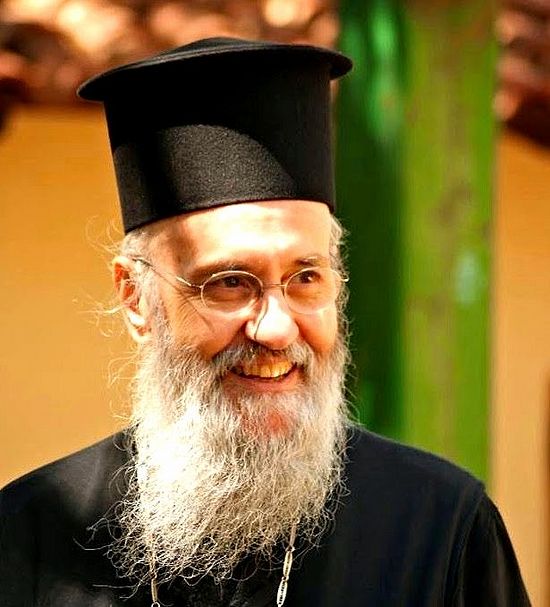
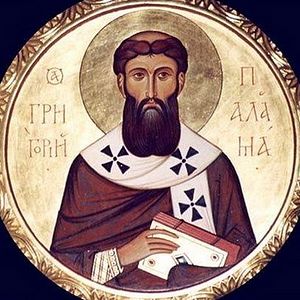
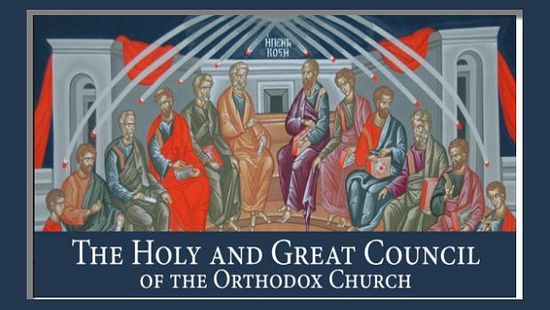
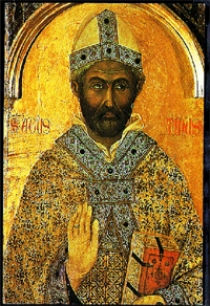
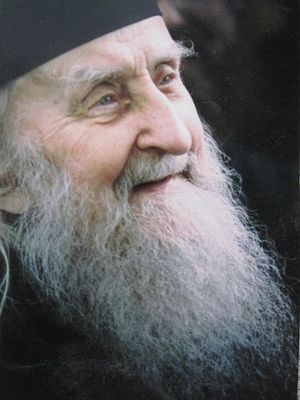
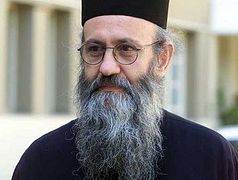
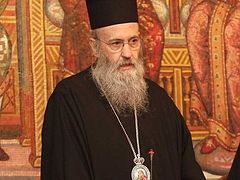
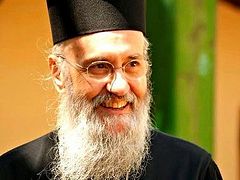
George Matsoukas
I would like to suggest that you change the term "Papist" in the second boldface line in section 5. The original Greek is " ". At its root, the word contains a nominalized adjective, (papikуs). The second edition of the by . lists two definitions: 1. 'one who is connected to the pope [sic]; phrase: the RomaioCatholic (Roman Catholic) Church; 2 (religion) catholic. Neither word is listed as derogatory. Yet virtually every English language dictionary labels "Papist" as "chiefly derogatory", among which are the Shorter Oxford English Dictionary, 6th edn.; the New Oxford American Dictionary, 2nd edn; the American Heritage Dictionary, 5th edn. lists it as "offensive" and includes in the definition "used as a disparaging term for a Roman Catholic."
I am sure His Eminence did not intend to use such slurs, and the original Greek does not seem to have the connotations that the term translated as "Papist" does. Please consider updating your translation.
Thank you.